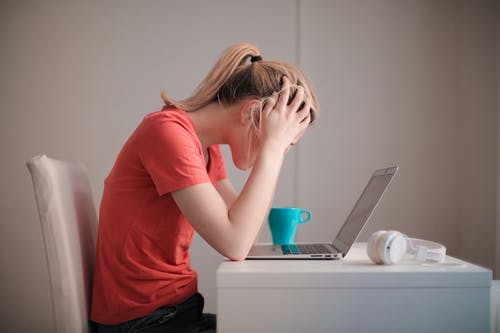How Anxiety Affects Digestion
Posted by Simple Girl on 11th Jul 2022

Do you get an upset stomach when you are in stressful situations? Perhaps you get a sudden urge to go to the bathroom after overhearing an argument. If so, stress and anxiety could be impacting your digestive system. Life can be stressful. Many people live in a chronic state of stress, which can contribute to health problems. If you have anxiety-induced stomach upset, there are ways to combat the stress.
The Brain-Belly Connection
Short-term stress isn't bad. It's a mechanism designed to protect us from danger, known as the fight or flight response. However, long-term stress keeps us in a state of fight or flight. Hectic lifestyles keep us running from task to task, and worries keep us awake at night. Our bodies and minds are overloaded and overwhelmed. This chronic stress response takes place in the brain but can affect all parts of the body. If you have ever felt butterflies in your stomach when you are nervous, then you have felt the effects of anxiety in your digestive system.
Symptoms
Anxiety-induced digestive issues can manifest in a variety of symptoms. The most common symptoms include cramps, bloating, indigestion, and nausea. Alternating periods of diarrhea and constipation may occur. Symptoms may vary in individuals.
Diagnosis
Consult your physician if you experience any of these symptoms. Don't just assume that stress is the cause. Conditions such as Irritable Bowel Syndrome (IBS) and peptic ulcer have the same or similar symptoms. There could be other underlying causes as well. Your doctor can perform a thorough examination and proper testing to determine the exact cause of your digestive disorder. However, if your physician determines that stress is the likely culprit, you will need to reduce your anxiety.
Stress Relief
Stress isn't always easy to get rid of, especially if you live or work in a stressful environment. However, here are a few ways to cope.
Get Sufficient Sleep
Adequate sleep is necessary to maintain physical and mental health. Lack of sleep can adversely affect the body by lowering immunity and increasing the risk of disease. Anxiety and depression are associated with poor sleep quality. Consider taking a nap if you must to make sure you get enough rest.
Exercise
Physical activity can help reduce the symptoms of anxiety. Exercise releases chemicals known as endorphins that create a feeling of well-being. Walking or jogging can tone your body and ease your mind. However, consult your physician before beginning any exercise regimen.
Connect with Nature
Spending too much time indoors can leave us feeling tense and anxious. Taking a walk in nature can help you relax. Sunshine and fresh air can make you feel invigorated.
Slow Down
If you take on more than your share of responsibilities, know your limit. Trying to do too much will only leave you stressed and exhausted. Learn to relax and make time for yourself. You need to take care of yourself before you can take care of everyone else.
Adequate sleep is necessary to maintain physical and mental health. Lack of sleep can adversely affect the body by lowering immunity and increasing the risk of disease. Anxiety and depression are associated with poor sleep quality. Consider taking a nap if you must to make sure you get enough rest.

